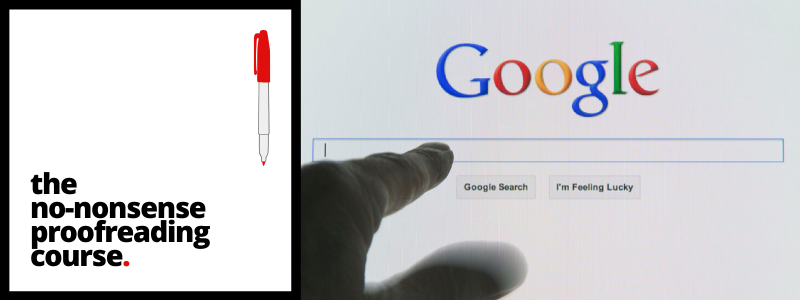Your Proofreading Business, SEO and Google.Your website is just the startIf you’ve been following my previous articles relating to the goal of becoming a self-employed proofreader, you’ll be aware that having your own website to present your proofreading business to the world involves more than simply creating a website. Building and promoting your site are pretty much covered in my previous articles, but this time, I thought I’d backtrack a little to explain the importance of Google and why you should try to stay in its good books. What is Google? Obviously, you know the answer to this one. Google is a search engine. But what does that mean? Well, it’s a piece of software that searches the internet in response to a query. So, if you google ‘proofreading courses’, Google will send its digital agents (sometimes called spiders) out into the internet looking for websites that match that query. But how does it know which websites to present first, which to present second, which to ignore entirely? When you key in a search query, the results are presented as a list, often referred to as SERPs (Search Engine Results Pages), which are listed in decreasing importance in relation to the original search query. In other words, the websites that most accurately answer or explain the original search query are listed at the top of the SERPs. Pretty simple, huh? Well, the basic function of keying a search query and receiving a list of the most appropriate answers may be simple to understand, but how Google arrives at the most appropriate answers is wrapped up in its own algorithms that decide which pages are shown and in which order. Needless to say, those algorithms are a deeply guarded secret. It’s also worth remembering that the SERPs don’t represent Google customers. The person keying in a search query (Keywords) is their customer, and Google is trying to deliver the best results for that customer. In establishing yourself as a freelance proofreader, you obviously want to appear at the top of the SERPs (or as near as possible) whenever your target search phrase (Keyword) is keyed into Google Search, because in doing so, you’ll enjoy a steady flow of visitors to your website. Make no mistake though, appearing at the top of the SERPs for a given phrase or keyword is the holy grail and getting there takes time and effort. Why Should You please Google? Since appearing in 1997, Google has been hands-down the number one search engine globally. Excluding China, it dominates every metric of search with approximately 90% of the global market share in 2019. In short, Google doesn’t just lead search engine market share, it dominates it. Search Engine Global Market Share (approx.)
The bottom line is this: pleasing Google and playing by their rules isn’t an option, it’s a must if you want your business to succeed online. This last point is so important that if you take nothing else from this article, please understand this. Google & SEO So, you’re on board with the notion of pleasing Google, but how? By learning and applying the disciplines of SEO. SEO stands for Search Engine Optimization, and by applying the disciplines of SEO as a website owner, you are trying to increase the quantity and quality of search traffic to your website through organic search engine results. Central to achieving this is keeping Google’s search customers happy. SEO is where all of the jigsaw pieces of Google’s algorithm come together and are presented in the form of a list of websites (SERPs). In order for Google to compile those website lists, they’ve crawled the pages of those sites and ranked them in terms of their SEO qualities. On-site SEO to improve your search engine visibility In creating your website, its primary goal is to attract visitors from your target audience, but to begin with, your target audience are first and foremost Google’s customers. And before they present your website to their customers, they’re going to make damn sure that your site completely satisfies the needs of their search customers before presenting your site to them. Google: The Dos & Don’ts… The Dos:
Some technical Dos…
Off-site SEO Off-site SEO focuses on your site’s external perception in terms of search engines and users, and more specifically the quality and reputation of links form other sites. Inbound links from other websites are good, but links from relevant and reputable sites are even better. EAT: An acronym for Expert, Authoritative, and Trustworthy If you manage to get inbound links from an expert, authoritative, and trustworthy site that also includes your target search phrase in the anchor text, then… well, it just doesn’t get better than that! Don’t rule out links from social… Google has flip-flopped on the relevance of inbound social media links, going from a big thumbs up with the rise in popularity of social platforms, to more recently suggesting that social media links don’t affect search rankings. Whilst inbound social links may not currently add weight to your site, they can still boost your traffic and spread awareness of your services. The Don’ts…
Hard as it is to believe, Google really does want your website to succeed and to appear at the top of SERPs just as much as you do, because in doing so, you’ll be providing a brilliant visitor experience and you’ll be providing their customers (the searchers!) with the most relevant and valuable experience for the search phrase they’re looking for! To make that happen, Google have created all the tools and resources you’ll need to achieve that and they’re readily available… for FREE! Google Search Console, and why you need it About Search Console
Google Search Console is a free service offered by Google that helps you monitor, maintain, and troubleshoot your site's presence in Google Search results. You don't have to sign up for Search Console to be included in Google Search results, but Search Console helps you understand and improve how Google sees your site’ Sign up for ‘Google Search Console’ here… If you’re new to SEO or just downright terrified of the subject, MOZ(.com) is a great place to start your SEO journey. You can find their brilliant ‘Beginner’s Guide to SEO’ here… Put ‘Understanding SEO and pleasing Google’ at the top of your To-Do List and you’ll be the owner of a successful proofreading business to be proud of. Bye for now. Jeff Full disclosure & disclaimer… Mike and I are not affiliated in any way to any sites listed above. This information is presented without condition or for personal profit in the hope that, having bought The No-Nonsense Proofreading Course you can make money proofreading without delay.
0 Comments
Your comment will be posted after it is approved.
Leave a Reply. |
Details
Testimonials
“I am one of those many fools who paid a huge amount of money for a useless course. This book... has opened so many doors for me. I now look on Mike as my mentor as I embark on a career. Thank you Mike.” Emma Steel, Proofreader and International Structural Editor. “ I thoroughly enjoyed the course and am so glad that I decided to take it... the whole experience was invaluable. My proofreading service is now well established and your course played no small part in getting it off the ground.” Hache L. Jones, Proofreader. “I'd just like to thank you first of all for writing such a great, straight forward eBook, and then going above and beyond what I would even expect as a customer by providing us, completely free of charge, updated versions months later!” Rachel Gee, Trainee Proofreader. “What can I say? Worth every penny and then some! God Bless! This a fabulous course.” Teresa Richardson, Proofreader. “As someone who has effectively been proofreading for thirty years, I found Mike’s No-Nonsense Proofreading Course an invaluable introduction and a very useful practical guide to many aspects of this discipline. I can wholeheartedly recommend it as the ideal starting point, and much more besides.” Jeremy Meehan, Proofreader. Blog AuthorMy name's Mike Sellars and I'm an experienced proofreader and the author of The No-Nonsense Proofreading Course. Click here to find out more about me. The No-Nonsense Proofreading CourseA Fraction of the Cost of Other Proofreading Courses NOTE: Stock is currently limited to 10 per day, so we can continue to deliver exceptional after-sales service, answer queries and provide open-door support. Credit card and PayPal payments accepted. “As someone who has been proofreading for 30 years, I found Mike’s course an invaluable introduction and a very useful practical guide to many aspects of the discipline. I can wholeheartedly recommend it.” Jeremy Meehan, Proofreader. Still want to find out more? Click here. Proofreading Categories
All
Proofreading Archives
July 2024
|


 RSS Feed
RSS Feed
